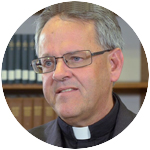
Father Thomas Dailey, O.S.F.S.
The timing could not be more better! In the opening verse of last Sunday’s Gospel, we hear Jesus calmly saying, “Do not let your hearts be troubled” (John 14:1a).
Our world is anything but calm. Our hearts have been troubled by the barrage of data indicating the toll of suffering and death wrought by COVID-19. Our hearts will be troubled by distancing measures that may make us suspiciously wary of one another when our social routines resume.
Jesus’s counsel, however, focuses inwardly, on troubles of the heart. His call for calm is not concerned with the bodily organ and the troubles it undergoes through a heart attack or heart disease. Nor does he address purely emotional troubles, as in the sorrow of heartache or the loss that comes with heartbreak.
[hotblock]
Rather, the biblical reference to the “heart” points to the whole person, as the very axis of who we are. There the powers of thinking, feeling, and decision-making reside, all of which are integrated in the “me” whose heart possesses each of these distinctly human abilities.
In this sense, the heart also serves as a sacred space. As St. Francis de Sales explains in his masterful “Treatise on the Love of God,” there the natural inclination we have toward happiness finds an affinity with the God who alone can satisfy the deepest longings of human life.
Troubled hearts, like those of the two disciples in the Gospel, experience impediments to happiness. Thomas is disturbed about the future as he admits to not knowing where Jesus is going or how he will get there; Thomas seems to fear that the band of followers may also get lost along the way. Philip wonders aloud where God is and wishes that the Master would simply show them the Father; he just cannot grasp that Jesus is God, one with the Father who dwells in Him.
We need not be astonished by the apostles’ comments; their queries are legitimate, even logical. Prior to the Resurrection, how could they fully understand who Jesus is? Faced with the impending departure of their leader, how could they not be disheartened? Their livelihood looks lost, their lives in danger — not unlike the troubles that currently afflict our world.
But Jesus offers them (and us) a way out: “You believe in God; believe also in me” (John 14:1b). Although we might expect such encouragement from a rabbi, the invitation comes with a subtle twist, as Jesus proposes a different sense of faith for them (and us).
[tower]
Like the disciples (“you believe in God”), we tend to conceive of faith in propositional terms. We believe that God exists. From divine revelation, we derive an understanding of what God is and what God does. Based on this knowledge, we strive to live out our faith by following divine dictates.
For Jesus, though, faith is more relational than notional. Fundamentally, it entails being in a personal relationship with him, believing “also in me.” Faith in this sense comes from the heart, not the head.
A relationship transcends time and space — as this one will endure even after the Master goes away from his disciples. A relationship produces a bond — as this one will reflect the union of Father and Son. A relationship cultivates communion — as this one will when those who believe come to experience the same divine Spirit that animates the Risen Lord.
The current days of our lives are marked by confusion, doubt, and questions regarding the spread of a novel coronavirus. The potential for troubled hearts persists. Medical science cannot alleviate that.
The current days of our faith are marked by the celebration of Easter. Believing in the Resurrection of Jesus invites us to go beyond a miraculous idea and deepen our relationship with him who overcame the greatest trouble imaginable. Thomas, Philip, and the other apostles did just this. Their faith gave rise to the church that continues in our midst.
Christians cultivate that faith experience, that believing relationship, through prayer, especially prayer to the Sacred Heart of Jesus. This spiritual calling of hearts-to-hearts was revealed, in an exceptional way, to St. Margaret Mary Alacoque, a 17th-century nun in the Visitation of Holy Mary who was canonized 100 years ago on May 13.
Through his words to her, Jesus invites the world to “behold this heart which has so loved the world that it is nothing but love and mercy.” Seeing the Sacred Heart is believing — with a renewed faith that does not let our hearts be troubled, even by a pandemic.
***
Father Thomas Dailey, O.S.F.S. is the John Cardinal Foley Chair of Homiletics and Social Communications at St. Charles Borromeo Seminary, Wynnewood, and a research fellow for the Catholic Leadership Institute in Wayne.
PREVIOUS: An urgent call: The Catholic Church’s Plan B moment
NEXT: Acts of bravery are the pandemic’s grace notes



Share this story